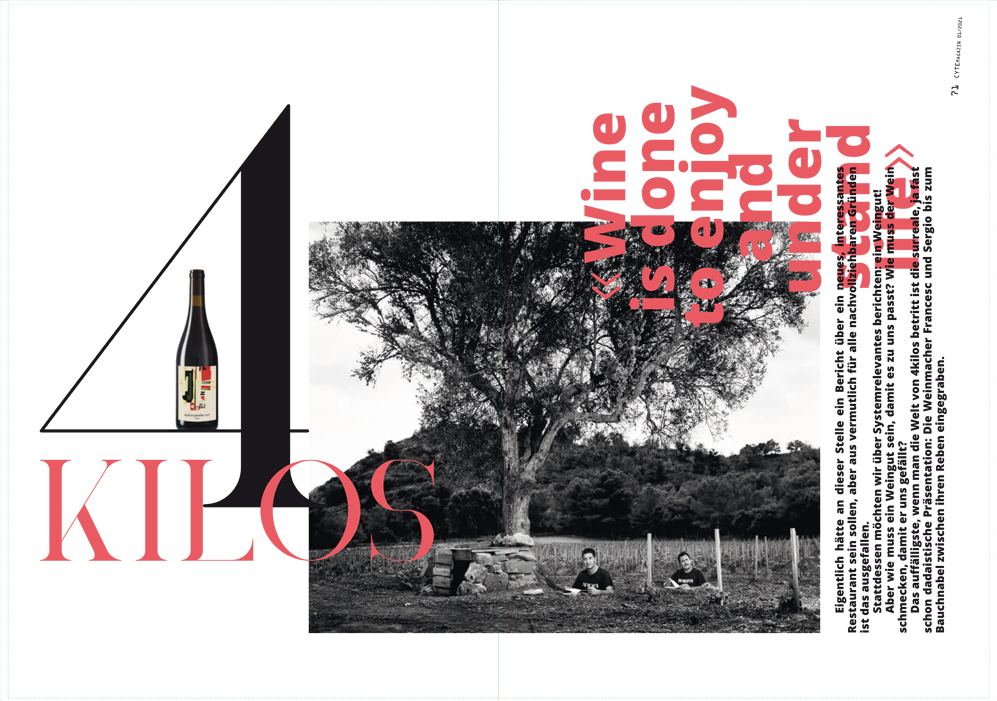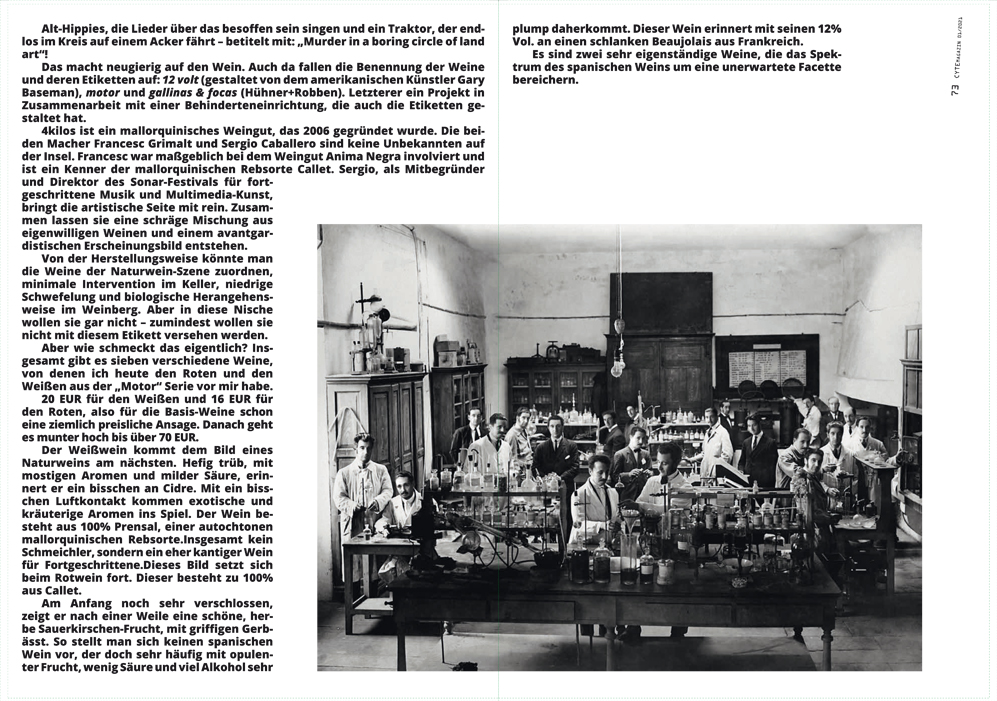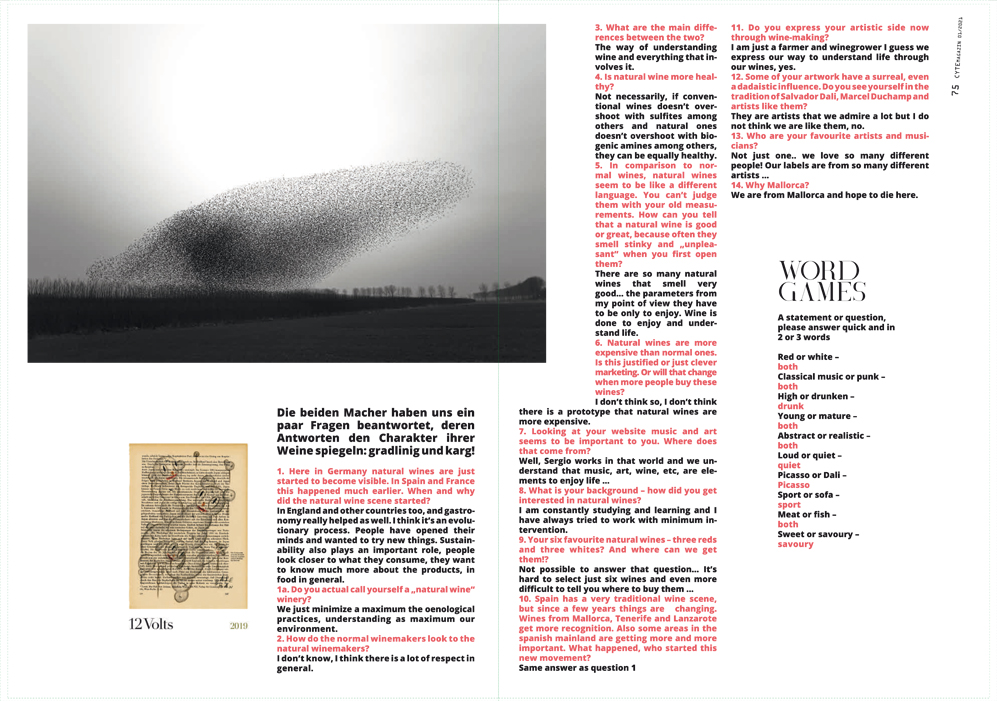


Eigentlich hätte an dieser Stelle ein Bericht über ein neues, interessantes Restaurant sein sollen, aber aus vermutlich für alle nachvollziehbaren Gründen ist das ausgefallen.
Stattdessen möchten wir über Systemrelevantes berichten: ein Weingut!
Aber wie muss ein Weingut sein, damit es zu uns passt? Wie muss der Wein schmecken, damit er uns gefällt?
Das auffälligste, wenn man die Welt von 4kilos betritt ist die surreale, ja fast schon dadaistische Präsentation: Die Weinmacher Francesc und Sergio bis zum Bauchnabel zwischen ihren Reben eingegraben.
Alt-Hippies, die Lieder über das besoffen sein singen und ein Traktor, der endlos im Kreis auf einem Acker fährt – betitelt mit: „Murder in a boring circle of land art“!
Das macht neugierig auf den Wein. Auch da fallen die Benennung der Weine und deren Etiketten auf: 12 volt (gestaltet von dem amerikanischen Künstler Gary Baseman), motor und gallinas & focas (Hühner+Robben). Letzterer
ein Projekt in Zusammenarbeit mit einer Behinderteneinrichtung, die auch die Etiketten gestaltet hat.
4kilos ist ein mallorquinisches Weingut, das 2006 gegründet wurde. Die beiden Macher Francesc Grimalt und Sergio Caballero sind keine Unbekannten auf der Insel. Francesc war maßgeblich bei dem Weingut Anima Negra involviert und ein Kenner der mallorquinischen Rebsorte Callet. Sergio, als Mitbegründer und Direktor des Sonar-Festivals für fortgeschrittene Musik und Multimedia-Kunst, bringt die artistische Seite mit rein. Zusammen lassen sie eine schräge Mischung aus eigenwilligen Weinen und einem avantgardistischen Erscheinungsbild entstehen.
Von der Herstellungsweise könnte man die Weine der Naturwein-Szene zuordnen,
minimale Intervention im Keller, niedrige Schwefelung und biologische Herangehensweise im Weinberg. Aber in diese Nische wollen sie gar nicht – zumindest wollen sie nicht mit diesem Etikett versehen werden.
Aber wie schmeckt das eigentlich? Insgesamt gibt es sieben verschiedene Weine, von denen ich heute den Roten und den Weißen aus der „Motor“ Serie vor mir habe.
20 EUR für den Weißen und 16 EUR für den Roten, also für die Basis-Weine schon eine ziemlich preisliche Ansage. Danach geht es munter hoch bis über 70 EUR.
Der Weißwein kommt dem Bild eines Naturweins am nächsten. Hefig trüb, mit mostigen Aromen und milder Säure, erinnert er ein bisschen an Cidre. Mit ein bisschen Luftkontakt kommen exotische und kräuterige Aromen ins Spiel. Der Wein besteht aus 100% Prensal, einer autochtonen mallorquinischen Rebsorte.
Insgesamt kein Schmeichler, sondern ein eher kantiger Wein für Fortgeschrittene.
Dieses Bild setzt sich beim Rotwein fort. Dieser besteht zu 100% aus Callet.
Am Anfang noch sehr verschlossen, zeigt er nach einer Weile eine schöne, herbe
Sauerkirschen-Frucht, mit griffigen Gerbstoffen, die den Wein nach Essen schreien lässt. So stellt man sich keinen spanischen Wein vor, der doch sehr häufig mit opulenter Frucht, wenig Säure und viel Alkohol sehr plump daherkommt. Dieser Wein erinnert mit seinen 12% Vol. an einen schlanken Beaujolais aus Frankreich.
Es sind zwei sehr eigenständige Weine, die das Spektrum des spanischen Weins um eine unerwartete Facette bereichern.
Die beiden Macher haben uns ein paar Fragen beantwortet, deren Antworten den Charakter ihrer Weine spiegeln: gradlinig und karg!
- Here in Germany natural wines are just started to become visible.
In Spain and France this happened much earlier. When and why did the
natural wine scene started?
In England and other countries too, and gastronomy really helped as well. I think it’s an evolutionary process. People have opened their minds and wanted to try new things. Sustainability also plays an important role, people look closer to what they consume, they want to know much more about the products, in food in general.
1a. Do you actual call yourself a „natural wine“ winery?
We just minimize a maximum the oenological practices, understanding as maximum our environment.
- How do the normal winemakers look to the natural winemakers?
I don’t know, I think there is a lot of respect in general.
- What are the main differences between the two?
The way of understanding wine and everything that involves it.
- Is natural wine more healthy?
Not necessarily, if conventional wines doesn’t overshoot with sulfites among others and natural ones doesn’t overshoot with biogenic amines among others, they can be equally healthy.
- In comparison to normal wines, natural wines seem to be like a
different language. You can’t judge them with your old measurements.
How can you tell that a natural wine is good or great, because often they smell
stinky and „unpleasant” when you first open them?
There are so many natural wines that smell very good… the parameters from my point of view they have to be only to enjoy. Wine is done to enjoy and understand life.
- Natural wines are more expensive than normal ones. Is this justified or just clever
marketing. Or will that change when more people buy these wines?
I don’t think so, I don’t think there is a prototype that natural wines are more expensive.
- Looking at your website music and art seems to be important to you. Where does that come from?
Well, Sergio works in that world and we understand that music, art, wine, etc, are elements to enjoy life …
- What is your background – how did you get interested in natural wines?
I am constantly studying and learning and I have always tried to work with minimum intervention.
- Your six favourite natural wines – three reds and three whites? And where can we get them!?
Not possible to answer that question… It’s hard to select just six wines and even more difficult to tell you where to buy them …
- Spain has a very traditional wine scene, but since a few years things are changing. Wines from Mallorca, Tenerife and Lanzarote get more recognition.
Also some areas in the spanish mainland are getting more and more important. What happened, who started this new movement?
Same answer as question 1
- Do you express your artistic side now through wine-making?
I am just a farmer and winegrower I guess we express our way to understand life through our wines, yes.
- Some of your artwork have a surreal, even a dadaistic influence. Do you see yourself in the tradition of Salvador Dali, Marcel Duchamp and artists like them?
They are artists that we admire a lot but I do not think we are like them, no.
- Who are your favourite artists and musicians?
Not just one.. we love so many different people! Our labels are from so many different artists …
- Why Mallorca?
We are from Mallorca and hope to die here
WORDGAMES
A statement or question, please answer quick and in 2 or 3 words
Red or white – both
Classical music or punk – both
High or drunken – drunk
Young or mature – both
Abstract or realistic – both
Loud or quiet – quiet
Picasso or Dali – Picasso
Sport or sofa – sport
Meat or fish – both
Sweet or savoury – savoury
Text: Stephan Ziehen
Photos: 4 kilos